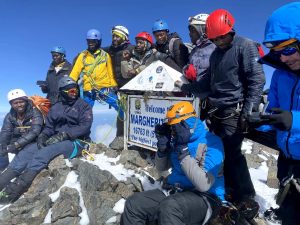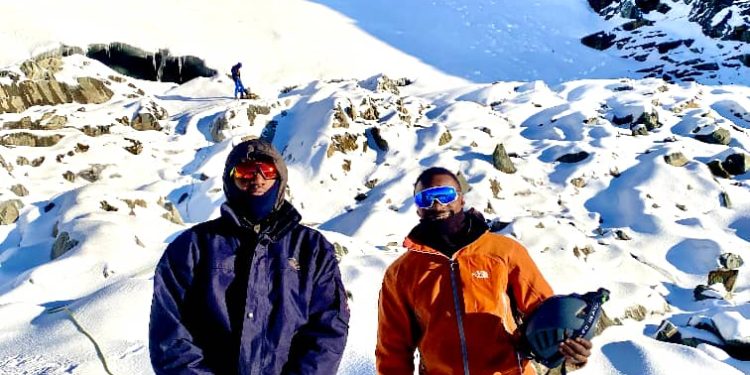The King of Tooro, Omukama Oyo Nyimba Kabamba Iguru Rukidi IV, has summited Mountain Rwenzori in a 10-day Royal Expedition to Margherita peak.
This was part of the campaign to draw attention to the impact of climate change, the significant role of environmental conservation and the promotion of the Rwenzori Mountains as a unique adventure tourism attraction.
One of the most visible consequences of climate change in Uganda is the rapid loss of glaciers, which have reduced from 6.5 square kilometres in 1906 to less than one square kilometre in 2003. If action is not taken, the Rwenzori glaciers may disappear before the end of this century.
The local communities living at the foothills of the Rwenzori Mountain continue to face destructive floods, as a result of the outbursts of River Nyamwamba whose source is traced in these mountains. Nonetheless, the mountains remain an important part of the Batooro, Bakonzo and Bamba Culture.
 Commenting on the expedition, The Minister of Tourism, Col Tom Butime, noted that he was pleased by the expedition, saying it will create more awareness on the enormous tourism attraction the Rwenzori Mountains are.
Commenting on the expedition, The Minister of Tourism, Col Tom Butime, noted that he was pleased by the expedition, saying it will create more awareness on the enormous tourism attraction the Rwenzori Mountains are.
He said the expedition documentary will attract special interest tourists who are keen on exploring new destinations such as Uganda and the unique experiences offered.
He directed Uganda Tourism Board (UTB) to continuously promote adventure tourism such as mountaineering not just in the Rwenzori region but in other mountainous regions in the country.
He said countries such as Nepal continue to position themselves as capitals of adventure tourism with over 11% (491,986 tourists) of the total arrivals (4,602,458 tourists) in the country participating in mountaineering between 2015 and 2019.
 Butime added that the Ministry of Tourism, will continue to support the private sector to develop bespoke tourism products in order to enhance traveller experiences throughout the country.
Butime added that the Ministry of Tourism, will continue to support the private sector to develop bespoke tourism products in order to enhance traveller experiences throughout the country.
“There is an urgent need to preserve the crown of snow on the Rwenzori Mountains. Therefore, we must be prepared to tackle the effects of climate change on our beautiful country today,” said Owekitinisa Joan Kantu, Minister of Tourism in Tooro Kingdom.
 The Rwenzori Ecosystem is a great contributor to tourism development. It is home to 54 Albertine rift endemic species; 18 mammal species, 09 reptile species, 06 amphibian and 21 bird species. Over 217 Bird species including the Rwenzori Turaco, the Bamboo Warbler, Golden Winged Sun bird and Scarlet tufted Malachite sun bird, have been recorded rendering the ecosystem as an important bird watching site in Uganda.
The Rwenzori Ecosystem is a great contributor to tourism development. It is home to 54 Albertine rift endemic species; 18 mammal species, 09 reptile species, 06 amphibian and 21 bird species. Over 217 Bird species including the Rwenzori Turaco, the Bamboo Warbler, Golden Winged Sun bird and Scarlet tufted Malachite sun bird, have been recorded rendering the ecosystem as an important bird watching site in Uganda.
In 1994, the Rwenzori Mountains were named as a UNESCO World heritage site and later as a Ramsar Site in 2008 due to the unique beauty and vegetation zones marked by grassland, montane forest, Bamboo, heather and afro-alpine moorland zones which support diverse species of bird and other wildlife.
Commenting on the Royal expedition, Hon Daudi Migereko, Chairman Board of Directors at UTB, said the 2022 Rwenzori Royal Expedition will not only create awareness on the restoration and protection of areas affected by climate change, but also drum up support for culture and heritage tourism.
 He said that the expedition has highlighted the untapped tourism product development opportunities available in the Rwenzori region that will offer an adventure of a lifetime to travellers from all over the world while in Uganda, the Pearl of Africa.
He said that the expedition has highlighted the untapped tourism product development opportunities available in the Rwenzori region that will offer an adventure of a lifetime to travellers from all over the world while in Uganda, the Pearl of Africa.
Mountain tourism, complimented by wildlife Safaris, primate tracking, bird watching in Queen Elizabeth, Kibale and Bwindi Impenetrable National Parks, is accented by culture and heritage of the local communities.
The Royal expedition is a partnership between the Ministry of Tourism, Wildlife & Antiquities, UNDP, Tooro Kingdom and UTB to promote sustainable adventure tourism under the Campaign – Conserving Mountain Ecosystems – intended to highlight the beauty and splendor of the Rwenzori Mountain ranges as one of the remaining equatorial glaciers in the world.











